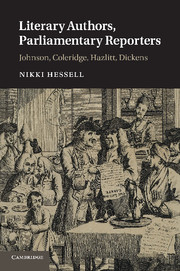Book contents
- Frontmatter
- Contents
- Acknowledgments
- Preface
- Chapter 1 Introduction: reporting and the individual talent
- Chapter 2 Samuel Johnson: beyond Lilliput
- Chapter 3 Samuel Taylor Coleridge and the freedom of the gallery
- Chapter 4 William Hazlitt and the real eloquence of the British Senate
- Chapter 5 Charles Dickens and the ghost of speeches past
- Chapter 6 Conclusion: taking parliamentary reporting seriously
- Bibliography
- Index
Chapter 5 - Charles Dickens and the ghost of speeches past
Published online by Cambridge University Press: 05 November 2011
- Frontmatter
- Contents
- Acknowledgments
- Preface
- Chapter 1 Introduction: reporting and the individual talent
- Chapter 2 Samuel Johnson: beyond Lilliput
- Chapter 3 Samuel Taylor Coleridge and the freedom of the gallery
- Chapter 4 William Hazlitt and the real eloquence of the British Senate
- Chapter 5 Charles Dickens and the ghost of speeches past
- Chapter 6 Conclusion: taking parliamentary reporting seriously
- Bibliography
- Index
Summary
In an 1856 letter to Wilkie Collins, Charles Dickens looked back on his time as a parliamentary reporter in the early 1830s and noted his talent for working in the press gallery, writing that “I left the reputation behind me of being the best and most rapid Reporter ever known … I could do anything in that way under any sort of circumstances – and often did. (I dare say I am at this present writing, the best Short Hand Writer in the World).” This view is backed up by the comments of his contemporaries in the gallery, such as Thomas Beard and James Grant, both of whom are cited in John Forster’s Life of Charles Dickens, and by Charles Mackay, the subeditor of the Morning Chronicle from 1836, who remarked that Dickens “had the reputation of being the most rapid, the most accurate, and the most trustworthy reporter then engaged on the London press.”
By the 1830s, the role of the parliamentary reporter had become systematized and professionalized. Dedicated press galleries had been established for the first time in both Houses of Parliament in the early 1830s. In the twenty years since Hazlitt worked for the Morning Chronicle, the major London papers had, by some accounts, doubled or even trebled the size of their parliamentary corps, which now included between eight and fifteen reporters. The one-hour turn that Hazlitt worked had shortened to forty-five minutes. It was possible by the 1830s to make between £300 and £400 a year working in the gallery, and the increased remuneration contributed to the growing appeal of parliamentary journalism as a career. An editorial in The Times pointed out that the previously disreputable press corps, made up largely of Irish immigrants who “came to England to be porters or re-porters, as luck might have it,” had been replaced with teams of young lawyers, who used their time in the gallery to gain money and experience before pursuing their careers. The public could now have faith in “the high character, the unsullied integrity, and the talent, and extensive information of the great body of the existing reporters.” The press gallery was now attracting the right sort of young man – clever, ambitious and observant.
- Type
- Chapter
- Information
- Literary Authors, Parliamentary ReportersJohnson, Coleridge, Hazlitt, Dickens, pp. 129 - 166Publisher: Cambridge University PressPrint publication year: 2011



